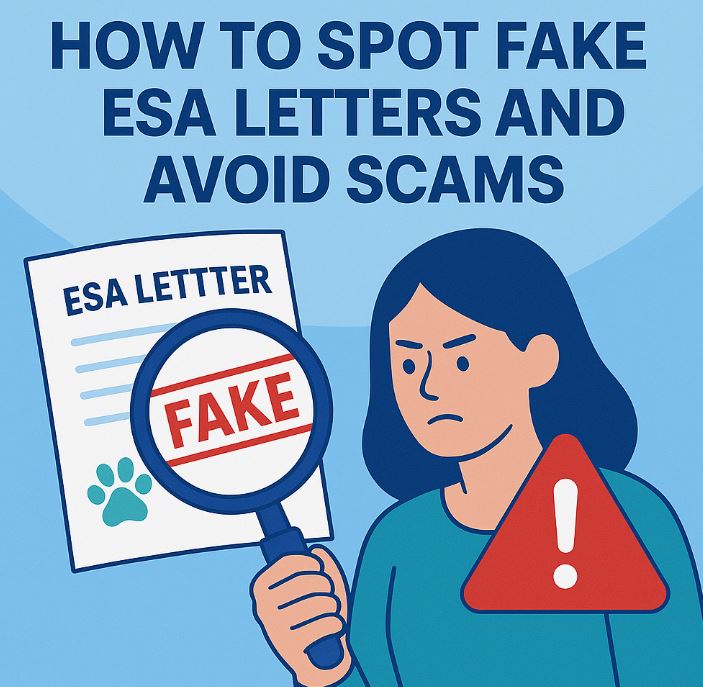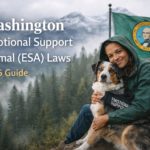How to Spot Fake ESA Letters and Avoid Scams

For many people, getting an Emotional Support Animal (ESA) letter is the key to keeping their companion animal by their side. A valid ESA letter gives you protections under the Fair Housing Act (FHA) — no-pet housing rules no longer apply, and landlords can’t charge pet deposits or fees.
But there’s a big problem: the internet is full of websites offering “instant ESA letters” that don’t hold up when landlords check them. These scams can cost you money, your housing, and even your legal standing.
So how do you tell if your ESA letter is legitimate or a scam? Let’s dive in.
Why ESA Letter Scams Exist?
ESA scams thrive for one reason: demand. Millions of people search for ways to live with their emotional support animals without facing fees, rejection, or eviction. Scammers know this and prey on vulnerable people by:
- Promising instant approval with no evaluation
- Offering “lifetime ESA letters”
- Using official-looking seals or logos to appear credible
- Advertising at ultra-low prices ($49–$69) to lure desperate buyers
The truth: a real ESA letter requires an evaluation by a licensed mental health professional (LMHP). If a website skips that step, it’s not legitimate — and your landlord will know.
Red Flags of Fake ESA Letters
Here are the most common signs that an ESA letter is fake:
- ❌ No evaluation required → You fill out a quick form and instantly get a letter.
- ❌ No provider details → Missing license number, state, or contact information.
- ❌ Out-of-state providers → Your provider must be licensed in your state.
- ❌ Lifetime promises → Real ESA letters typically need annual renewal.
- ❌ Public access claims → ESAs don’t have ADA rights. Only PSDs do.
- ❌ Suspicious formatting → Letters that look like copy-paste templates with no official letterhead.
What a Legit ESA Letter Should Include?
A genuine ESA letter should look professional and verifiable. Here’s what belongs in it:
- Full name and credentials of the provider (psychologist, psychiatrist, LCSW, LPC, LMFT)
- License type, number, state of issuance, and expiration date
- Provider’s contact details (phone/email/office address)
- Date of issuance (within the last 12 months)
- Statement that you have a mental/emotional condition and your ESA helps alleviate symptoms
- Issued on official letterhead, signed by the provider
Pro Tip: Before submitting your letter to a landlord, check the provider’s license in your state’s database. If you can’t find them, neither will your landlord.
Why Fake ESA Letters Backfire?
Submitting a fake ESA letter might feel like a shortcut, but it usually creates bigger problems:
- ❌ Housing rejection → Landlords can deny requests if letters aren’t verifiable.
- ❌ Loss of FHA protection → Without a valid letter, you’re legally considered a pet owner.
- ❌ Legal risk → In states like Florida and California, submitting fake ESA documents can result in fines or even misdemeanor charges.
- ❌ Damaged trust → Fake letters make landlords more suspicious of all ESA claims, making it harder for legitimate tenants to be approved.
How Landlords Spot Fake ESA Letters?
Landlords have become savvy because fake letters are so common. When you submit your ESA letter, they typically:
- Check the provider’s license
- They’ll look up the license number in a public state database.
- If the license is expired, from another state, or doesn’t exist — red flag.
- Review formatting
- A real ESA letter will be on professional letterhead, signed, and dated.
- Sloppy formatting, missing details, or generic templates = suspicion.
- Look at timeliness
- Most landlords require letters issued within the last 12 months.
- Call for confirmation
- Landlords may call the provider’s office to verify legitimacy.
- They cannot ask about your diagnosis, but they can confirm whether the letter was issued.
Submitting a clean, verifiable letter makes approval smooth and stress-free.
Step-by-Step Guide: How to Check if Your ESA Letter is Real
Before handing your letter to a landlord, run through this checklist:
- Verify the license – Look up your provider in your state’s licensing database.
- Check the date – Is it issued within the last year? If not, renew.
- Look for full details – Name, credentials, license info, contact details must all be present.
- Confirm the format – Official letterhead, signature, professional language.
- Watch for red flags – Words like “lifetime approval” or “instant guarantee” are signs of a scam.
If your letter passes all five checks, you’re on solid ground.

Case Study: The Cost of a Fake ESA Letter
Sarah’s Story
Sarah bought a $59 ESA letter online. It promised “instant approval” and said it was valid for life. Excited, she submitted it to her landlord. Within a day, her landlord checked the license — it didn’t exist. Her request was denied, and she had to pay $400 in pet fees just to keep her cat.
James’s Story
James, a veteran with PTSD, went through a telehealth evaluation with a licensed psychologist. His letter included license details and was verified instantly by his landlord. His ESA was approved without fees, and his housing request went smoothly.
FAQs About Fake vs Real ESA Letters
Do ESA letters expire?
Not officially, but most landlords require updated letters every 12 months. The clinicians that also write the letters want to verify every 12 months that the treatment is working and should continue, establishing continuity of care.
Are online ESA letters valid?
Yes, but only if they come from a licensed mental health professional in your state after a real evaluation.
Do I need ESA registration in addition to the letter?
Registration isn’t legally required, but many ESA owners use ID cards, certificates, and vests from NSAR to reduce friction with landlords and housing offices.
Can I get in trouble for using a fake letter?
Yes. States like Florida impose fines and even misdemeanor charges for submitting fraudulent ESA documentation.
The Safe Way: Work With Trusted Providers
The safest way to protect your housing rights is to work with a provider you can trust. That means:
- Licensed in your state
- Provides full license details on the letter
- Available for landlord verification
- Issues letters with professional formatting
That’s why thousands trust NSAR. We connect you with licensed mental health professionals who conduct proper evaluations and issue legitimate ESA letters that landlords accept.
The Bottom Line
Fake ESA letters may seem convenient, but they’ll cost you in the long run. A legitimate ESA letter protects your rights under the Fair Housing Act, but only if it comes from the right source.
Don’t gamble with your housing. Get your ESA letter through NSAR and rest easy knowing it’s legitimate, verifiable, and trusted by landlords.

















































































